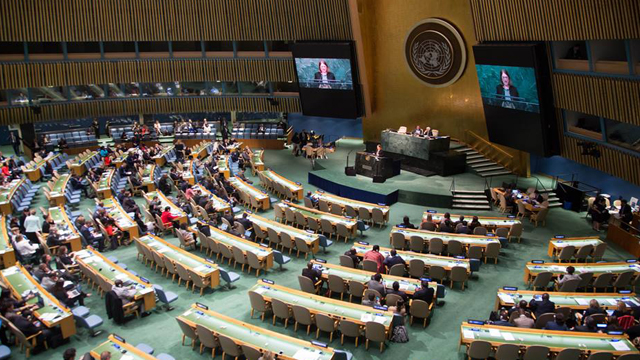After a long gestation, the UN drug reform experiment suffered a miscarriage. It seems the UN is not the catalyst of change but its mirror. Reformers can learn many lessons – but can also be proud of their achievements.
Those who hoped this would be a watershed event must be feeling disappointed, after the closure of the UN General Assembly Special Session. As we reported earlier, the UNGASS adopted a weak and vague outcome document on the first day, in the opening plenary, without a debate. So the plenary debates and round-table discussions, which were supposed to shed new light on the world’s efforts to control drugs, were essentially no more than lip-service, and had no real impact on the system.
I have always been among the sceptics who didn’t believe that the UNGASS would bring much change, so this was not a real disappointment for me. I think drug policy reform has never come from the UN, and it never will. The UN is only a mirror that reflects the power structure of the world and what is happening at a national level. Its systemic inertia does not permit it to be the catalyst for change.
That said, it doesn’t mean that all advocacy efforts targeting the UN are necessarily meaningless. The UN is an important forum for power-play among world powers, and provides a platform for interaction between civil society and member states. What is more, it is a stage which NGOs can use, in order to highlight the flaws of the system in front of the watching eyes of the public. That’s why we, the Rights Reporter Foundation, attended the event and produced a movie about it.
(For the YouTube version, click here!)
I couldn’t help but feel uncomfortable when governments in the “progressive camp” criticised the outcome document they had just adopted. I mean, people would be justified in asking, “Why the hell did you adopt the document without a debate, in that case?” Is maintaining the so called “Vienna consensus on drugs” so important that it justifies lending support to a document lacking any clear guidance on issues such as harm reduction, the death penalty, or the criminalisation of drug use, not to mention the regulation of drug markets?
The Czech Minister of Health, Svatopluk Nemecek, had an answer to this question. He said his government was only supporting the outcome document because it believes that this is just start of the debate, which will continue in 2019. Well, let’s hope he’s right! The world is changing, Canada announced at the UNGASS that it will legalise cannabis, Mexico announced that it will decriminalise drug use. If more and more countries are pushing for drug policy reform, it will definitely affect swinging member states which have no clear vision.
Some people have also pointed out that the outcome document includes some progressive achievements: for example, it supports access to essential medicines (partly as a consequence of repressive drug policies, millions of people cannot access pain medication). True. But the question is, what is the impact of having supportive language in the outcome document? It provides guidance for member states – but without civil society pressure, it will not be implemented at national level. We should bear in mind that changing the UN language is only the first step – using UN documents in advocacy is the next one.
For many NGOs, the UNGASS was an unpleasant experience. The UNGASS leadership changed its rules about accessing meetings daily, civil society representatives had to stand in line for hours to get in, and many of them missed the slot for their own speeches. Some people say this was intentional, aimed at excluding civil society from discussions. I don’t know the truth of it. Having stood in a queue for two hours myself to get in, I can tell you that it was not a warm welcome, not to mention stupid security rules such as the media being banned form moving around unescorted inside the building, or from doing interviews in the corridors without special permission from the media office.
Nevertheless, there was an unprecedented level of participation from civil society, often characterised by forms of expressions of emotions which are unusual in the highly formalised environment of the UN – such as NGOs cheering or booing speakers, to the great embarrassment of some diplomats. There were tons of side events, plenty of rallies and art installations around the UNGASS, and NGO speakers made the most factual and most lively interventions at the plenary and round-table debates. The voice of the movement has been heard – and it is something we can be proud of!

Drugreporter’s posters are used in action by the protesters of the Students for Sensible Drug Policy (SSDP)

I think we should be modest though, both in our expectations and self-evaluation. We should not make the same mistake the drug warriors so often make (measuring success by the number/intensity of efforts of implementation), for example when they cite an increase in police seizures as proof that prohibition works. The sheer number of NGO participants, the intensity of their speeches, selfies with ourselves at the plenary etc. do not prove that the drug reform movement is being successful. We have a long way to go, and the real battles will not be fought in the UN, but in national parliaments, local councils, schools, on the streets and most importantly, in the hearts and minds of the people.
Posted by Peter Sarosi
Videographer: Istvan Gabor Takacs, reporter: Peter Sarosi




